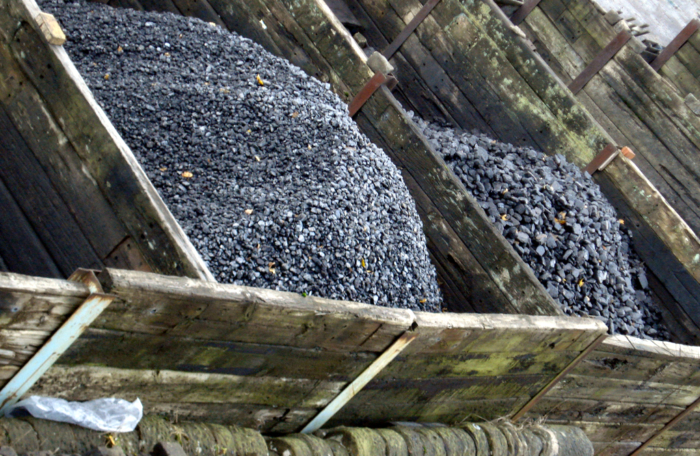Eliminating coal is a gas, gas, gas
On Tuesday, a few protesters dumped a few buckets of coal at the State House. It was, they said, a bold act of civil disobedience because they stole the coal from the Merrimack Station power plant in Bow. Yes, they admitted this. They even helpfully provided the Bow Police with evidence by posting an incriminating photo on their own website.
Activists organized by the Climate Disobedience Center routinely commit crimes against fossil fuel infrastructure. They theorize that a rapidly arriving climate catastrophe justifies the criminality. The Tuesday publicity stunt was orchestrated to pressure the state to shut down the coal-burning Merrimack Station.
’60s-style protesting is a gas, as they said back then. But sometimes logic and clear thinking get lost in all the excitement of “sticking it to the man.” Inconvenient truths are hard to see when blinded by self-righteousness. Among them: these activists have helped prolong the life of Merrimack Station and increase the number of days it operates.
Merrimack Station is no longer in daily use because fracked natural gas is cheaper to burn than coal. The station remains online only as a backup generator for when the region’s natural gas plants can’t meet demand, primarily during winter and summer spikes.
The station is most needed during periods of peak demand, and New England’s peak electricity demand comes in… August. Last year’s heaviest day of electricity use was August 29. Activists demanded the closure of New Hampshire’s most important backup power plant right when it is most needed to prevent blackouts. Genius.
Environmental activists demand that the coal plant be shuttered and replaced with renewable energy. But wind and solar cannot fill this spot need because they are not on-demand power sources. They generate power when nature dictates, not when humans flip a switch.
Ironically, coal remains a go-to backup power source in large part because activists have succeeded in restricting New England’s supply of the cleaner, cheaper fuel that has nearly displaced coal entirely: natural gas.
Huge supplies of cheap natural gas produced by fracking dramatically dropped the price of electricity in New England in the last decade, dropping coal to just 1 percent of the region’s energy generation.
“The high efficiency of natural-gas-fired generators and the generally low cost of nearby domestic shale gas (which emerged as a resource in 2008) are largely responsible for a 46% decrease in the average annual price of New England’s wholesale electricity over the past 10 years,” ISO New England, the region’s non-profit electric grid operator, wrote in this year’s Annual Energy Outlook. “Lower wholesale prices translate into lower power-supply charges for consumers.”
Abundant, cheap natural gas was the single biggest factor in the almost complete collapse of coal use in New England.
“Since 2000, electricity generation from coal has declined and the contribution from natural gas has increased markedly, primarily because two large natural gas-fired power plants came online in 2002 and 2003,” the U.S. Energy Information Administration has concluded. “However, as increasing amounts of natural gas are used to generate electricity, in New Hampshire and in New England as a whole, assurance of natural gas supply has become a critical energy issue for the region.28“
Critically, the EIA notes that after years of decline, coal use in New Hampshire has been trending upward as natural gas use has fallen.
“New Hampshire’s natural gas-fired generation has declined in the past three years and now is at its lowest level since 2002. The decrease has been compensated for primarily by increases in coal-fired generation and hydroelectric power.29”
In other words, we were on the verge of eliminating coal as a fuel source when a decline in natural gas generation caused a turn back to coal to fill the gaps.
Much of the credit for this goes to climate activists who have helped to block natural gas pipeline and import terminal construction. By slowing the construction of new natural gas infrastructure, activists from the Climate Disobedience Center and other groups forced electricity generators to turn to coal to meet demand on peak days.
Climate Disobedience Center activists have boasted about protesting, among others, the expansion of the Algonquin Pipeline, which would bring additional natural gas supplies into New England, further reducing the region’s dependence on dirtier-burning coal and fuel oil.
A few years ago, ISO New England commissioned a study of natural gas capacity. It projected that inadequate pipeline capacity would lead to gas shortages on 24-34 days per winter by the winter of 2019-20.
Days like those are when Merrimack Station is fired up.
The quickest way to close Merrimack Station is not to protest its operation. The quickest way is to stop blocking the pipelines that would supply New England with enough natural gas to replace coal permanently.
(Photo credit: Si Wilson, Flickr)



